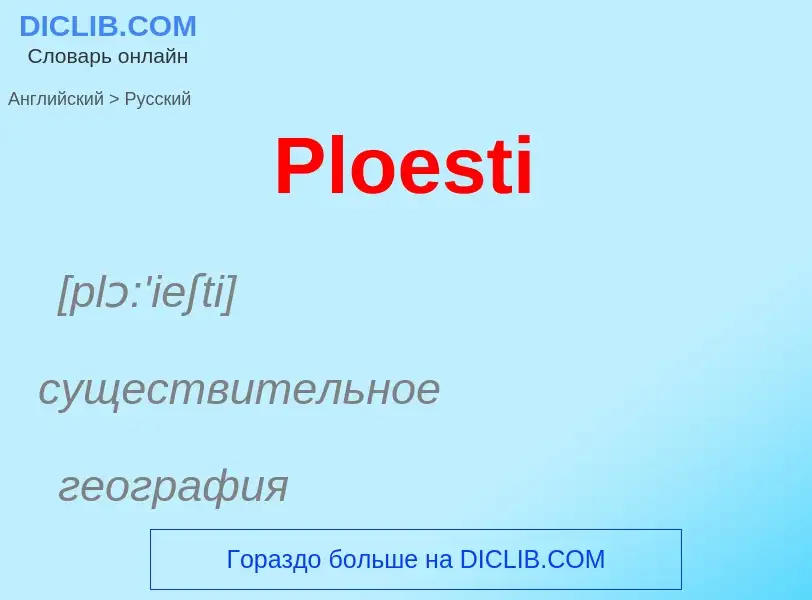Traducción y análisis de palabras por inteligencia artificial ChatGPT
En esta página puede obtener un análisis detallado de una palabra o frase, producido utilizando la mejor tecnología de inteligencia artificial hasta la fecha:
- cómo se usa la palabra
- frecuencia de uso
- se utiliza con más frecuencia en el habla oral o escrita
- opciones de traducción
- ejemplos de uso (varias frases con traducción)
- etimología
Ploesti - traducción al ruso
[plɔ:'ieʃti]
существительное
география
г. Плоешти
Wikipedia
Ploiești (UK: ploy-ESH-tee, US: plaw-YESHT-ee, Romanian: [ploˈjeʃtʲ]), formerly spelled Ploești, is a city and county seat in Prahova County, Romania. Part of the historical region of Muntenia, it is located 56 km (35 mi) north of Bucharest.
The area of Ploiești is around 60 km2 (23 sq mi), and it borders the Blejoi commune in the north, Bărcănești and Brazi communes in the south, Târgșoru Vechi commune in the west, and Bucov and Berceni communes in the east. According to the 2021 census, Ploiești is the tenth most populous city in the country with a population of roughly 181,000.
The city grew beginning with the 17th century on an estate bought by Michael the Brave from the local landlords, gradually taking the place of the nearby Wallachian fairs of Târgșor, Gherghița and Bucov. Its evolution was accelerated by heavy industrialisation, with the world's first industrial scale petroleum refinery being opened in 1856–1857. Following massive exploitation of the oil deposits in the area, Ploiești earned the nickname of "the Capital of Black Gold". In the present, its economic activity is still based on oil processing, the city having three large refineries and other industries related to this branch.
Ploiești is also an important transport hub, linking the capital with the regions of Transylvania and Moldavia. The city has direct access to the Prahova Valley, one of the most important alpine tourism areas in Romania.


![The City hall, formerly the headquarters of [[Petrom]], a Romanian oil company and the largest corporation in the country The City hall, formerly the headquarters of [[Petrom]], a Romanian oil company and the largest corporation in the country](https://commons.wikimedia.org/wiki/Special:FilePath/Ploiesti (9).jpg?width=200)
![Columbia Aquila refinery burning after the raid of B-24 Liberator bombers, [[Operation Tidal Wave]], in 1943 Columbia Aquila refinery burning after the raid of B-24 Liberator bombers, [[Operation Tidal Wave]], in 1943](https://commons.wikimedia.org/wiki/Special:FilePath/Ploiesti 1943 bombardament.jpg?width=200)

![A [[trolleybus]] in Ploiești in 2021 A [[trolleybus]] in Ploiești in 2021](https://commons.wikimedia.org/wiki/Special:FilePath/Ploiesti Solaris trolleybus 5933 in 2021.jpg?width=200)







